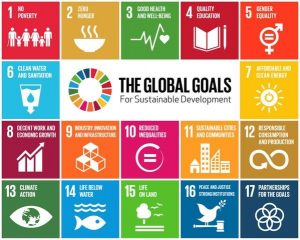
August 14, 2017//-With a few swipes on a smartphone or clicks on a computer, these days many of us choose and purchase a wealth of goods and services without giving it a second thought. This is how the best technology works – so simple and easy to use that not so long ago it would have seemed like magic.
But those of us concerned with improving the lives of people in developing countries know that there are systems behind the sorcery: policy systems that enable and reward innovation; economic systems that allow raw materials, components and finished goods to flow across borders; financial systems that secure investments and payments; regulatory and legal systems protecting workers and consumers.
Like any complex system, the digital transformation of our economies and societies requires a multiplicity of moving parts. The international community has a responsibility to promote more effective collaboration between these moving parts to avoid widening the divides between those positioned to reap the rewards of technological change and those that risk being left behind.
Recent years have witnessed a rapid growth in electronic commerce as both consumers and enterprises go online to find what they need. At UNCTAD, we estimate that global e-commerce grew from $16 trillion in 2013 to $22 trillion in 2015, at a time when world production and trade grew very slowly.
The trend is set to continue in the coming years. Digitalization will further transform what we do and how we do things. The rise of robots, automation, the emergence of completely new products, services and business models such as Uber and Airbnb, self-driving cars, smart grids and many more will create opportunities for entrepreneurs and businesses as well as bringing massive consumer benefits.
At the same time, this trend will disrupt existing practices in many areas, expose incumbents to competition, change the skill requirements of workers and lead to the loss of jobs in countries and sectors.
Like previous large-scale economic transitions the benefits will be immense, but they will not materialize through a smooth, cost-free process.
The effects will differ between countries, industries and people, depending on their ability to adapt and respond to the new digital economy. This increases the need for all countries, enterprises and people to carefully consider what actions to take in order to prepare as best as possible.
In the context of the 2030 Agenda for Sustainable Development, it is our common responsibility in the United Nations and other international organizations to provide the necessary support to those countries that are less equipped to face this transformation.

As we look toward how technology can be harnessed to achieve the Sustainable Development Goals, the case of e-commerce provides a case in point. What does this transformative method of trade offer?
E-commerce can:
- Become a driver of inclusive growth and sustainable development by empowering women as entrepreneurs and traders (Goal 5: Target 7; “Undertake reforms to give women equal rights to economic resources, as well as access to ownership and control over land and other forms of property, financial services, inheritance and natural resources, in accordance with national laws” and Target 8; “Enhance the use of enabling technology, in particular information and communications technology, to promote the empowerment of women“)
- Support productive activities, create decent jobs, entrepreneurship, creativity and innovation, and encourage the formalization and growth of micro-, small- and medium-sized enterprises (MSMEs), including through access to ICT-enabled financial services (Goal 8: Target 3)
- Help MSMEs gain access to financial services (including online and mobile payments) and their integration into value chains and markets (including virtual marketplaces) (Goal 9: Target 3)
- Contribute to significantly increasing the exports of developing countries, in particular doubling the share of global exports by Least Developed Countries by 2020 (Goal 17: Target 11)
But the e-commerce divide is huge. While 60-80% of people in many developed countries already shop online, the equivalent share in most of the world’s countries is below 3%.
An UNCTAD-led initiative, eTrade for All, which was launched at our Ministerial Conference in Nairobi in July 2016, is a concrete example how the international community, in partnership with other stakeholders, can come together to make our support fit for purpose.
Current efforts are simply inadequate. They are highly fragmented and of insufficient scale. To raise a country’s e-commerce readiness, a number of policy areas need to address holistically the development of affordable ICT infrastructure, logistics and trade facilitation, the legal and regulatory environment, payment solutions, skills development and entrepreneurship financing, as well as the funding of e-commerce innovation.
That is why a much more concerted approach is essential.
The UNCTAD-led eTrade for All initiative raises awareness of opportunities, challenges and solutions related to e-commerce in developing countries, mobilizes financial and human resources for e-commerce projects in developing countries; and strengthens coherence and synergies among partners’ activities.
The main tool is an online platform, which can help developing countries and donors navigate the supply of technical and financial support available to foster e-commerce and digital trade, learn about trends and best practices, and to raise visibility for the various partners’ initiatives and resources. The platform was officially launched in April 2017 during the UNCTAD E-Commerce Week in Geneva.
More than 20 national and international organizations had joined the initiative as of February and we expect the group to expand during 2017. Some 25 private sector entities have also joined the Business for eTrade Development initiative, which helps public-private dialogue.
To make e-commerce a vehicle for sustainable development we need to connect the dots. There is a need to bring all relevant stakeholders together – as opposed to continuing our bad habit of working in silos – and to work simultaneously across different policy areas.
It is my hope that the approach applied by eTrade for All can be emulated in other areas where information and communications technologies should support the Sustainable Development Goals.
In this way, we will respond more effectively to the desire among people in developing countries to connect to the new world of technological progress and the prosperous future they deserve.
By Mukhisa Kituyi, Secretary-General of UNCTAD

